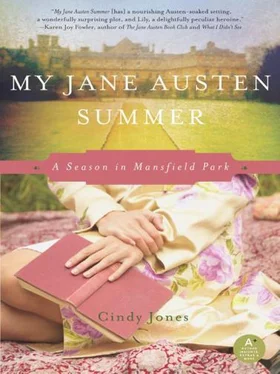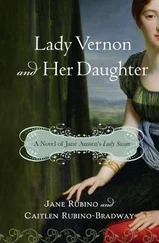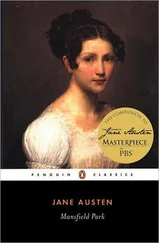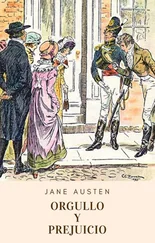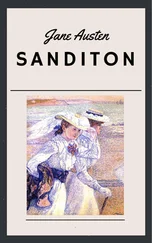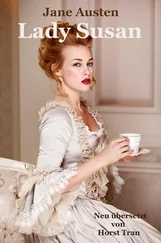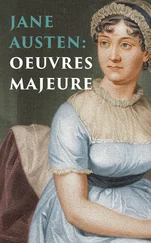However, the best friend experience demonstrated that a person could carry on a complete relationship, from initial infatuation, to blow-up, to establishing boundaries, with someone who has been dead two hundred years! Thus Lily's relationship with the imaginary Jane Austen embodies my idea of the dynamics of a contemporary woman's relationship with Jane Austen, taken to its end.
Why did you choose to shadow Mansfield Park ?
Mansfield Park is my favorite Austen novel. A later work, it seems darker and more mature to me and I like the Romantic elements. However, my favorite aspect is that Jane Austen favors the quiet, reserved Fanny Price over the witty, gregarious Mary Crawford. I like to think of Jane Austen as a Champion of Introspective Women.
Where do you stand in the Fanny Wars?
I love Fanny Price. I completely identify with a person who creates an interior world through reading, and I admire her courage in taking such a strong stand against Henry Crawford and Uncle Bertram. I do sometimes wonder if it is probable for her to endure with such determination, considering her miserable up-bringing. And it would not have bothered me if she didn't marry Edmund, as long as Edmund didn't end up with Mary Crawford. Lily Berry is my contemporary riff on Fanny Price, with Lily indulging in more failure than Fanny was allowed in her story.
How did you research this book?
I'm no scholar, so the task of depicting a literary conference required some work on my part. Aside from a lot of reading (my favorites are listed here in a selected bibliography), I spent years lurking on two Internet discussion lists listening to erudite conversation, learning how it sounds when Austen scholars discuss her work. One could almost get a free graduate degree in Jane Austen Studies by paying attention online. New threads of discussion arrive via e-mail daily, strong positions are constructed and defended, and further resources are regularly suggested.
What were the fun parts to write?
No one in the real world would hire me to develop a Jane Austen literary festival. But in my imagination, I'm in charge. From the volunteer check-in desk, to opening day enactments, I created every atom of my characters' world. And it was fun. I went house hunting on the Internet, seeking the perfect English manor, not too Palladian but big enough to house a literary festival. I have no practical interest in houses or decoration, but on a virtual level, I found it fascinating, poring over books on Georgian architecture, old house renovations, antique furnishings, and floor plans to create the perfect house—in my head. I used my experience at Squaw Valley Writers Conference as a reference for people gathered blissfully around the written word. I drew on memories of growing up in a family of educators where raised voices usually meant my grandfather was making his point. I chose scenes from Mansfield Park and Lovers' Vows to illuminate the action in My Jane Austen Summer . I enjoyed creating the flow of activities at the festival and the intellectual texture of a literary conference.
Which part of this book is written from the heart?
I wanted to write about a woman who breaks her cycle of unhappiness. This was the one aspect that was not negotiable in the many revisions. We all know people who repeat mistakes over and over, as if they were characters in a book, ink on a page with no second chances. But I believe people can change if they can imagine themselves differently. And the first step to imagining a difference is to see oneself truthfully. Self-knowledge is gained through observation, introspection, and examination of experiences.
Novels are a shortcut to examined experiences. Anyone who reads has a head start because the author does all the work, producing a story where complex characters act under pressure and either succeed or fail. The truth of an accurate portrayal in a novel resonates, as if to say: This is how life is . Like a cautionary lesson, sometimes I see myself reflected in the characters' situations, sometimes I see people I know. But when an author shines a light on a situation, and it resonates, and I can relate the experience to myself, I am saved a lot of time and trouble: disasters from which I learn, without having to experience them for myself. Jane Austen is expert at portraying human nature. True life resonates on every page, big scenes and small exchanges. I admire Jane Austen, agree with her judgment, and can't think of a better teacher for a young woman struggling with Lily's issues. Even though reading on the job got Lily fired, the examined experiences in Jane Austen's novels help Lily imagine a better way to confront her problems. Through learning from failures, guidance from Willis, and immersion in Austen's literature, Lily becomes a more stable person. Books are good for you.
What about the ending?
All of Jane Austen's novels end with a wedding. Although the ending of My Jane Austen Summer is not conventionally happy, Lily gains a sense of identity and the confidence to eventually write her own happy ending. Like the Don't give a man a fish proverb: Don't give a character a wedding; teach her to love her self and she'll find happiness for a lifetime.
Discussion Questions
1. After being fired for reading on the job, Lily warns that reading can be dangerous to one's mental health. But the literary festival is all about books! Discuss the theme of reading in My Jane Austen Summer . How has reading shaped Lily's hopes and dreams? What role do books play as Lily con fronts her demons?
2. Describe Lily's relationship with her imaginary Jane Austen. How does the relationship change as the story progresses? Would this story work if Lily's imaginary friend had been Charlotte Bronte or Edith Wharton?
3. Her mother's death is very hard for Lily. How does it affect her relationships with Vera and her imaginary Jane Austen? What is the significance of the necklace and why is Bets so cavalier with it?
4. Lily wants a relationship so badly that she keeps squeezing herself into undersized romances. Why is a good relationship beyond her reach? When she discovers Martin with Ginny, Lily says, "I could have done earth for him." Why does she make this comment and what does it say about Lily? What are Lily's demons? When does she finally confront them? What advice would you give her?
5. Discuss the meaning of only connect from Howard's End . According to Omar, it's about connecting one's thoughts with one's deeds. According to Lily, it means relating to people with greater gusto. Omar suggests that Lily join him at his university once the festival ends and spend her time connecting disjointed personalities. But can Lily connect herself? Do any of the characters in this story only connect ?
6. Willis has secrets. He tells Lily he's working on his master's thesis but Lily discovers he's writing something completely different. Willis's other secrets are hurtful to Lily. How should Willis have behaved differently? Does Lily bear responsibility for not reading him more carefully?
7. Discuss Lily's family secret. How has it shaped her character and how does it impact her behavior at the literary festival? Discuss parallels between Willis's relationship with Lily and her father's relationship with his mistress. Archie and Magda? Maria Bertram and Henry Crawford? The baron in Lovers' Vows ? Lily faults her mother for not confiding the truth before she died. Do you think Lily's parents should have told her? How much do children need to know about their parents' private lives?
8. Omar tries to prevent Lily from pursuing her self-destructive urges on the evening of the follies, but Lily runs away from him. Magda tries to give Lily sisterly advice, which Lily ignores. What makes for a healthy friendship? Is Omar a good friend to Lily? Is Bets a good friend to Gary? Is Lily a good friend to anyone?
Читать дальше
